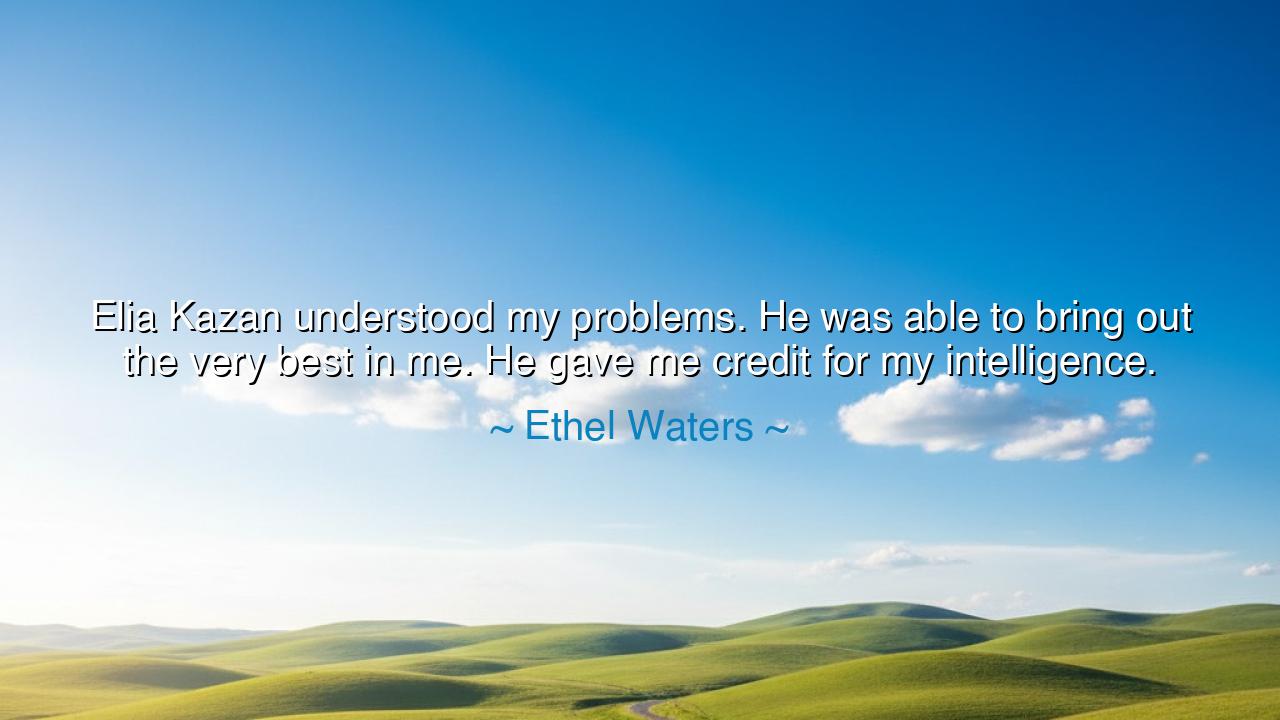
Elia Kazan understood my problems. He was able to bring out the
Elia Kazan understood my problems. He was able to bring out the very best in me. He gave me credit for my intelligence.






When the great performer Ethel Waters spoke these words—“Elia Kazan understood my problems. He was able to bring out the very best in me. He gave me credit for my intelligence”—she was not merely giving praise to a director. She was unveiling a sacred truth that transcends stage and screen: that the power of understanding, the gift of recognition, and the honoring of another’s mind can transform a soul weighed down by struggle into one radiant with purpose. These words are a hymn to the spirit of compassion that awakens hidden greatness. They remind us that human beings bloom not in judgment, but in the light of being truly seen.
Ethel Waters was a woman forged in hardship. Born into poverty, facing prejudice and loneliness, she rose through the shadows to become one of the first Black women to achieve fame in both music and acting. Yet even in her success, she was often treated as less than equal, as though her brilliance were a mere accident rather than the fruit of her mind and will. Then came Elia Kazan, a man of vision and sensitivity. He did not look at Waters as a singer playing a part—he saw her as a thinking artist, a soul capable of depth, emotion, and reason. By acknowledging her intelligence, he did what few had done before: he gave her the dignity of partnership, not pity.
It is said that when a teacher sees the potential in a student, that student can surpass the limits of their own belief. So it was with Waters. Under Kazan’s guidance, she delivered performances that shimmered with truth, as though his faith in her had unlocked a door long sealed by pain. The ancients would call this the alchemy of recognition—the divine exchange between two spirits where understanding becomes transformation. To be understood is to be healed; to be respected is to be reborn.
In every age, there have been such awakeners—those who draw forth the greatness buried within others. Consider Socrates, who through gentle questioning awakened wisdom in his pupils, not by instructing them what to think, but by teaching them to know themselves. Like Kazan, he saw intelligence not as something to impose, but as something to honor and reveal. When he gave credit to the minds of others, he lit torches that would burn through centuries. Ethel Waters’ story is the same fire reborn in another time.
But there is a deeper current flowing through this quote, one that speaks to all who have felt unseen. To be denied recognition for one’s intelligence is to be exiled from one’s own worth. Yet when another looks upon us with faith, something sacred happens—the soul remembers itself. Kazan’s understanding was not merely artistic; it was human. In that moment, Waters stood not as a performer, but as a complete being, affirmed and empowered. Such recognition is rare and holy, for it demands both humility and wisdom.
From this, let us learn a timeless lesson: greatness often sleeps within those the world has overlooked. The task of the wise is not to dominate, but to draw forth; not to instruct, but to believe. When you lead, whether as a teacher, friend, or parent, do not seek to mold others into your image. Instead, see them for who they truly are, and honor their mind. Speak words that awaken. Offer trust that strengthens. For when you give credit for another’s intelligence, you breathe life into their hidden fire.
In your own journey, seek both to find and to become such a person. Surround yourself with those who understand your struggles, who see not only your flaws but your potential. And in turn, strive to do the same for others. When you look into another’s eyes, ask not, “What can they do for me?” but rather, “What greatness can I call forth from them?” In this way, you will become like Kazan to Waters—a light that helps another rise, and in doing so, your own light will shine ever brighter.
Thus, Ethel Waters’ words become a sacred teaching for generations: that understanding, faith, and recognition are the trinity of human growth. When one person dares to see the divine intelligence in another, the world is made new. Let this be your path: to understand deeply, to bring forth the best in others, and to give credit where the soul deserves it. For in lifting another to their greatness, you ascend to your own.






AAdministratorAdministrator
Welcome, honored guests. Please leave a comment, we will respond soon